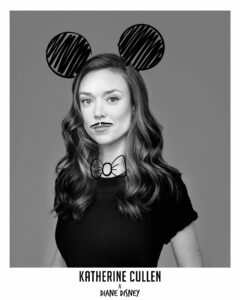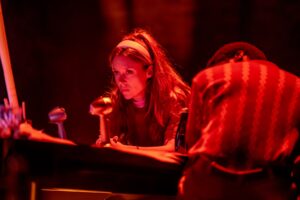Katherine Cullen’s unusual role in “Death of Walt Disney”
Katherine Cullen, familiar to audiences for her vast body of acclaimed theatre work, is currently starring as Walt Disney’s daughter in Lucas Hnath’s A Public Reading of an Unproduced Screenplay About the Death of Walt Disney. The Canadian premiere of the boldly experimental play is co-presented by Outside the March and Soulpepper Theatre and directed by Mitchell Cushman.

Cullen is energized by the immersive aspect of the production. When audience members enter the Baillie Theatre, they find not the usual rows of seats, but an open space with a screen playing Disney’s upbeat and iconic black-and-white animated film Steamboat Willie. A cutting-edge animated film when it was released, it depicts the version of Mickey Mouse that (to Disney’s dismay) recently entered the public domain, and can now be used by anyone without any copyright concerns. Setting the tone for the performance to come, the film is at once an emblem of the vaunted Disney empire and a reminder that even the strongest empires are fighting a losing battle with time.
A path guides audience members past the screen and curtain to the actual stage area. “The most exciting thing about the way we’re staging the show is that it’s on the actual stage of Soulpepper’s Baillie Theatre, and the audience gets to sit in very close proximity to the action,” Cullen explains. To bring them into the imagined complex realities behind the Disney juggernaut, the audience sits in the round, in two rows of seats arranged on the stage itself. They are just inches from the action, which revolves around a centrally situated desk with a chair on each side, in which the four actors sit.
This staging underscores the themes of Hnath’s play – particularly the division between public and private personas, and what really takes place behind closed doors. A Public Reading of an Unproduced Screenplay About the Death of Walt Disney is structured as a dramatic reading of a darkly comedic screenplay exploring Walt Disney’s life and legacy during his final days. Disney himself is the main reader, the main character – and, it seems pretty clear, the writer. The intimate staging makes audience members feel like they are eavesdropping on a private, at times controversial performance – one they should probably not be privy to.
In the script he reads, Walt Disney (a towering, magnetic performance by theatre great and a Soulpepper founding member, Diego Matamoros) reflects on his ambitions and achievements, and unfolds the darker aspects of his personality and his hunger for control and permanence. The three other characters (or more accurately, actors) who join him are his brother Roy (Anand Rajaram), his unnamed daughter (Cullen), and her husband, his son-in-law Ron (Tony Ofori). They provide different perspectives on Disney’s actions and their consequences —though because it is Walt’s screenplay and reading, he and he alone dictates the sequence of scenes. He calls out with relish each setting change, establishing shot and close-up. And he cuts scenes short – flinging pages to the floor – when he doesn’t like what the actor / character is revealing. From start to finish, he exerts iron-fisted control over what is disclosed or discussed, and when. The play explores themes of power, control, creation, and the complexities of a visionary’s legacy – all wrapped in this meta-theatrical format that blurs the lines between reality and fiction.

Outside the March excels in providing unexpected, out-of-the-box immersion, and A Public Reading of an Unproduced Screenplay About the Death of Walt Disney delivers this in an especially absorbing and unusual form. Cullen describes working with Outside the March on the play as “both challenging and exhilarating”. The precision required in the script provides an extraordinarily rigorous framework within which the actor/character operates, but “once you get in the groove, it can really take off.” But it’s important to be careful because “it’s very easy to lose your way, and you can’t improvise out of it!”
Within the tight confines of that framework, Cullen delivers a compelling performance which moves from understated and acted upon, to assertive and enraged, and finally to resigned and in control. Remarkably, Cullen’s character spends the first half of the play unnamed and unacknowledged, sitting silently at the desk with Disney and his brother Roy, listening and reacting non-verbally to their words. At this point, the audience has no idea who she is or why she is there. When she eventually is acknowledged and the script grants her her first lines, she is just “Daughter” – defined solely by her role in relationship to star and scriptwriter Walt.
The role demands an emotional authenticity that pushes more and more emphatically against the egocentricity of Walt’s script and its need to make other characters secondary and subservient to his empire-building ambitions. “The character I’m playing has to confront her life and her relationships with a kind of uncompromising honesty, despite it being uncomfortable,” Cullen reflects. “I think that’s fascinating, and it drew me to the role because the character is able to shred a kind of self-deception that’s hard to do in life” (and even harder to do in art that is an expression of another character’s egotism).
The role of Disney’s daughter resonates deeply with Cullen, particularly in certain moments that mirror personal experiences, such as a poignant hospital scene in the last part of the play, which she finds “very evocative to play.” Of course, authentic portrayals are her bread and butter. A founding member of Outside The March theatre company, her selected theatre credits include Mr. Marmalade, Passion Play, Vitals. Burns: A Post Electric Play, TomorrowLove, The Nether and Trojan Girls and the Outhouse of Atreus. (Read SesayArts’ interview with the playwright of Trojan Girls, Gillian Clark here.) Audiences will also remember Cullen’s Dora-Award nominated and deeply personal show Stupidhead! A Musical Comedy, co-created with Musical Director Britta Johnson. Stupidhead! dives into the world of neurodiversity through Cullen’s personal experiences growing up with dyslexia and her challenges with numbers and spatial concepts. The show offers a candid look at the challenges and the triumphs of living with a learning disability, and celebrates personal differences. Stupidhead! has been presented in multiple formats, including live audio broadcasts and intimate porch performances – and has built personal connections with audiences in these multiple contexts. The show has received widespread praise for its ability to combine humour, music, and emotional resonance to deliver a compelling and empathetic experience.

From a young age, Cullen was drawn to the spotlight. “I have a vague recollection of making my grandmother laugh over some bit I was doing about chocolate cake as a very young kid,” she shares. This early experience of bringing joy through performance was a pivotal moment that set her on the path to a career in acting. And Cullen’s personal life with her actor husband Colin Doyle is also rich with artistic synergy, humour and playfulness: “The first roles we played together, well before we got married, were Homer and Marge Simpson!”
You can see Cullen, Matamoros, Rajaram and Ofori on the Soulpepper stage in the arresting, edge-of-your-seat A Public Reading of an Unproduced Screenplay About the Death of Walt Disney until May 12, 2024. Reserve tickets at soulpepper.ca.
© Arpita Ghosal, SesayArts Magazine, 2024
About The Author
Arpita Ghosal
Arpita Ghosal is a Toronto-based arts writer. She founded Sesaya in 2004 and SesayArts Magazine in 2012.
Visit About Us > Meet the Team to read Arpita’s full bio …



